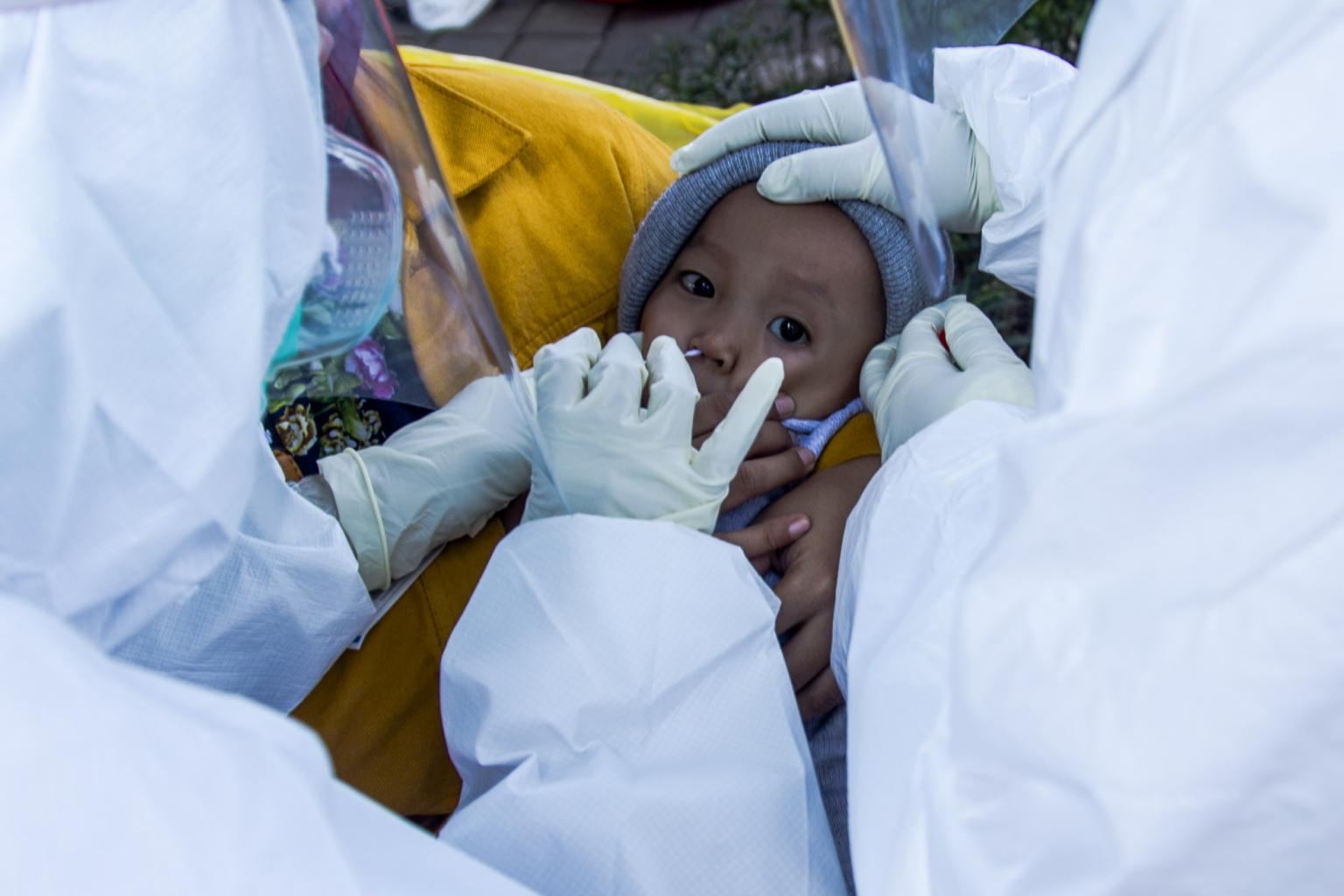Indonesia set to have world's highest rate of child deaths from Covid-19
Sign up now: Get insights on Asia's fast-moving developments

Health care workers collect specimen samples from a child during a Covid-19 swab test in Surabaya, on July 20, 2020.
PHOTO: EPA-EFE
Follow topic:
JAKARTA - More than 300 children in Indonesia, including newborn babies and those below the age of six, are believed to have died from Covid-19, a phenomenon that could see the country having the world's highest rate of child deaths from the novel coronavirus.
This is the gloomy forecast of the Indonesian Paediatric Society (Idai), which reported 51 child deaths since March 17 out of a total of 2,712 confirmed cases as of Monday (July 20).
It pointed out that another 290 out of 7,633 young children suspected to have the disease might have died from the virus.
Idai chairman Aman Bhakti Pulungan said on Thursday (July 23) that Indonesia has "recorded the greatest number of child deaths (from the virus) in Asean and even Asia".
"As the pandemic is not yet over, Indonesia will likely have the highest rate of child deaths from Covid-19 in the world," he added, noting that no such deaths have been reported in neighbouring Singapore, Malaysia, and Thailand.
Indonesian health officials blame the high number of child deaths from the virus, which mostly kills the elderly, on their underlying health conditions, like malnutrition, as well as poor health facilities.
Idai said that 45 children who died from Covid-19 had such maladies as central nervous system infection, tuberculosis, gastrointestinal infection, acute malnutrition and dengue haemorrhagic fever.
Dr Aman added that late diagnosis and treatment caused the death of most of the children below the age of six.
"There were a lot of children who received treatment less than 24 hours, 36 hours or 48 hours before they died," he said. "Some were diagnosed only after they had died."
A 40-day-old baby in Pamekasan, East Java, died of Covid-19 on June 21 after allegedly contracting the virus from neighbours who had visited the family a few weeks earlier.
The disease also claimed the life of a nine-month-old child in Mataram, West Nusa Tenggara, on May 23.
Similarly, a 15-month-old girl died in Batam on May 23, a day after her mother took her to a hospital because she had fever and diarrhoea.
Mr Tjetjep Yudiana, who heads the provincial health agency of the Riau Islands, told The Straits Times: "She was about to be tested but she died. She was underweight, so her immune system was weak."
Children make up almost one-third, or 83 million, of Indonesia's population of nearly 270 million.
Dr Aman has suggested that children with symptoms such as diarrhoea and fever should be tested for the coronavirus.
Mr Jasra Putra, a commissioner of Indonesian Child Protection Commission, has called on the country's health authorities to swab the children of parents being tested. "If their parents are tested, the children must also be tested," he said.
Tests can also help the government to map out the situation and generate health service policies in line with their needs, like distributing vitamins to boost children's immunity, he added.
Mr Nahar, the deputy for child protection at the Women's Empowerment and Child Protection Ministry, said the government has been trying to increase testing across the country.
"If many more people are tested, the infection to children can be prevented," added Mr Nahar, who, like many Indonesians, goes by one name.
Another concern highlighted by Mr Jasra is that more than half of the infected children contracted the disease from their parents.
With the easing of social restrictions in many parts of the country, the chances are high that more children be stricken by Covid-19.
He said parents need to be educated about health protocols, like the wearing of masks, so that they do not become carriers, bringing the disease home to their children.

